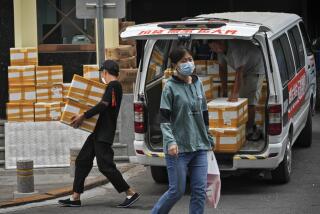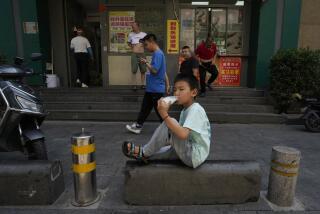Hong Kong Economy Down 7% From Year-Ago Quarter
- Share via
HONG KONG — Hong Kong’s recessionary economy suffered its worst-ever quarterly contraction Friday, shrinking 7% from the same period last year, as officials gloomily predicted at least two more quarters of negative growth before a rebound is likely.
“As for next year, I do not feel optimistic about economic numbers for the first two quarters,” said Hong Kong Financial Secretary Donald Tsang. “It is not clear that we have bottomed out or that we are close to bottoming out.”
Based on the third-quarter figures for gross domestic product announced Friday, Hong Kong officials were forced to revise their end-of-year projection on growth from negative 4% announced in August to negative 5%. This is more in line with forecasts from independent sources such as the International Monetary Fund, which also predicted a 5% year-end drop, the first annual decline in Hong Kong’s fortunes since at least 1961. Merrill Lynch, meanwhile, has predicted 6% negative growth for the year.
Hong Kong officials said the economic crisis affecting the Asian trading capital, which has seen property prices decline by nearly 50% in one year, is the most severe in modern times.
“This present economic adjustment is more difficult than the one we had during the first oil crisis” in 1975, Tsang said.
The government report showed precipitous declines in consumer spending, exports and imports. External trade is the backbone of the economy in Hong Kong, which has made its fortune as a warehouse for goods coming in and out of mainland China.
“Export performance suffered a significant setback,” Hong Kong chief economist K.Y. Tang announced, blaming the 7% third-quarter drop in total exports on the “further plunge in export demand in those East Asian economies hit by the regional financial turmoil.”
The disruption in air cargo handling during the start-up of Hong Kong’s new airport in July and August also contributed to the bigger-than-expected drop in exports, Tang said.
Some other Hong Kong-based analysts, such as Credit Suisse First Boston economist Dong Tao, saw some signs of hope in the figures.
“We see some tentative positive signs,” he told Reuters. “Property prices have stabilized, equities have rebounded, tourist arrivals have picked up, and the retail sales deceleration is losing momentum.”
Still, the numbers all pointed to a gloomy winter holiday season for the 6.6 million people in the Special Administrative Region of China, which had experienced nearly four decades of uninterrupted growth until this year.
In addition to the anticipated drop in GDP, the government announced seasonally adjusted unemployment figures for the three months ending in October at 5.3%, the highest since 1961, when economic statistics were first published here.
“These were quite depressing figures,” said Tsang, the normally enthusiastic financial secretary.
Stock market rallies generally begin six to nine months ahead of recoveries in the real economy. Thus, some investors see the recent run-up in share prices as marking the end of the slide caused by the Asian currency crisis, which ravaged Hong Kong’s financial markets after beginning in Thailand in July last year.
Still, Tsang spoke only of glimmers of hope for the economy.
Some economists think the Hong Kong economy has finally bottomed out. As evidence, they point to falling interest rates and the 61% jump in the benchmark Hang Seng stock index since Aug. 13.
More to Read
Sign up for Essential California
The most important California stories and recommendations in your inbox every morning.
You may occasionally receive promotional content from the Los Angeles Times.













